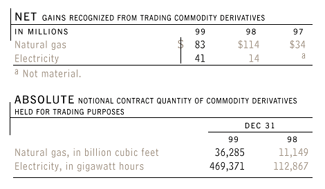
7- RISK MANAGEMENT AND FINANCIAL INSTRUMENTS-COMMODITY DERIVATIVES
Duke Energy, primarily through Trading and Marketing, manages its exposure to risk from existing contractual commitments and provides risk management services to its customers through forward contracts, futures, over-the-counter swap agreements and options (collectively, "commodity derivatives"). Energy commodity forward contracts involve physical delivery of an energy commodity. Energy commodity futures involve the buying or selling of natural gas, electricity or other energy-related commodities at a fixed price. Over-the-counter swap agreements require Duke Energy to receive or make payments based on the difference between a specified price and the actual price of the underlying commodity. Energy commodity options held to mitigate price risk provide the right, but not the requirement, to buy or sell energy-related commodities at a fixed price.Commodity Derivatives - Trading
Trading Duke Energy engages in the trading of commodity derivatives, and therefore experiences net open positions. Duke Energy manages open positions with strict policies which limit its exposure to market risk and require daily reporting to management of potential financial exposure. These policies include statistical risk tolerance limits using historical price movements to calculate a daily earnings at risk measurement. The weighted-average life of Duke Energy's commodity risk portfolio was approximately 20 months at December 31, 1999.

Commodity Derivatives - Non-Trading
At December 31, 1999 and 1998, Duke Energy held or issued several commodity derivatives, primarily in the form of swaps, that reduce exposure to market price fluctuations for certain power and NGL production facilities. At December 31, 1999, these commodity derivatives extended for periods up to ten years. The gains, losses and costs related to non-trading commodity derivatives that qualify as a hedge are not recognized until the underlying physical transaction closes. At December 31, 1999 and 1998, Duke Energy had unrealized net gains (losses) of $(120) million and $10 million, respectively, related to non-trading commodity derivatives. The determination of unrealized net gains (losses) requires judgment in interpreting market data and developing estimates of fair value. Accordingly, the unrealized net gains (losses) as of December 31, 1999 and 1998 are not necessarily indicative of the amounts Duke Energy could have realized in the current market.
-INTEREST RATE DERIVATIVES
Duke Energy periodically enters into financial derivative instruments including, but not limited to, swaps, options and treasury rate agreements to manage and mitigate interest rate risk exposure related to borrowings. The notional amounts shown in the following table serve solely as a basis for the calculation of payment streams to be exchanged. These notional amounts are not a measure of the company's exposure through its use of derivatives. Fair values shown in the following table represent estimated amounts that Duke Energy would have received if the swaps had been settled at current market rates on the respective dates.
Deferred gains on settled interest rate derivatives were not material in 1999 or 1998. Unrealized gains and losses and exposure to changes in market condition were not material at December 31, 1999 and 1998. As a result of the interest rate swap contracts which swap fixed rate obligations to effective floating rates, interest expense for the relative notional amount on the Consolidated Statements of Income and Comprehensive Income is recognized at the weighted average London interbank offered rate (LIBOR) for the year plus the applicable margins.
-FOREIGN CURRENCY DERIVATIVES
Trading and Marketing enters into foreign currency swap agreements to manage foreign currency risks associated with energy contracts denominated in foreign currencies. As of December 31, 1999, the agreements had a notional contract amount of approximately $762 million, beginning in the year 2000 and extending to the year 2005, and had a weighted average fixed exchange rate of 1.470 Canadian dollars to U. S. dollars. As of December 31, 1998, the agreements had a notional contract amount of approximately $120 million, beginning in the year 2000 and extending to the year 2005, and had a weighted average fixed exchange rate of 1.472 Canadian dollars to U. S. dollars. The fair value of foreign currency swap agreements was not material at December 31, 1999 or 1998.In anticipation of the tender offer for Paranapanema (see Note 19 to the Consolidated Financial Statements), Duke Energy entered into foreign currency forward contracts to obtain Brazilian reais. As of December 31, 1999, the forward contracts had a notional amount of $280 million at an average exchange rate of 1.8496 Brazilian reais to U. S. dollars which approximated fair value.
-MARKET AND CREDIT RISK
New York Mercantile Exchange (Exchange) traded futures and option contracts are guaranteed by the Exchange and have nominal credit risk. On all other transactions previously described, Duke Energy is exposed to credit risk in the event of nonperformance by the counterparties. For each counterparty, Duke Energy analyzes its financial condition prior to entering into an agreement, establishes credit limits and monitors the appropriateness of these limits on an ongoing basis. The change in market value of exchange-traded futures and options contracts requires daily cash settlement in margin accounts with brokers. Swap contracts and most other over-the-counter instruments are generally settled at the expiration of the contract term and may be subject to margin requirements with the counterparty.-FINANCIAL INSTRUMENTS
The fair value of financial instruments is summarized in the following table. Judgment is required in interpreting market data to develop the estimates of fair value. Accordingly, the estimates determined as of December 31, 1999 and 1998 are not necessarily indicative of the amounts Duke Energy could have realized in current market exchanges. The majority of the estimated fair value amounts were obtained from independent parties.
The fair value of cash and cash equivalents, notes receivable, notes payable and commercial paper are not materially different from their carrying amounts because of the short-term nature of these instruments or because the stated rates approximate market rates.Guarantees made on behalf of affiliates or recourse provisions from affiliates have no book value associated with them, and there are no fair values readily determinable since quoted market prices are not available.


